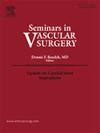80岁和90岁老人无症状颈动脉狭窄的处理和结局
IF 2.4
3区 医学
Q1 PERIPHERAL VASCULAR DISEASE
引用次数: 0
摘要
随着医学的发展和预期寿命的增加,80多岁和90多岁的人是无症状颈动脉狭窄(ACS)缺血性中风风险增加的人群。尽管老年人中风导致显著的残疾和死亡率,但在这一人群中,ACS的管理数据很少,无法为临床实践指南提供信息。作者试图评估目前关于老年人ACS的管理和结果的文献。先前比较颈动脉内膜切除术与单独最佳药物治疗的具有里程碑意义的随机对照试验受到质疑,因为现代最佳药物治疗策略自其构想以来已显著发展。这些研究要么没有包括80多岁和90多岁的老人,要么涉及的样本量有限,这使得将这些发现应用于老年人群体具有挑战性。在我们的综述中,两个特别感兴趣的领域是颈动脉血运重建术和风险分层的潜在益处。回顾性研究表明,颈动脉内膜切除术可以改善老年人的认知功能。在一般人群中,虚弱与颈动脉血管重建术术后较差的预后有关,尽管很少有数据表明虚弱对80岁和90岁老人预后的影响。总的来说,关于80多岁和90多岁老人ACS的临床管理的文献有限,需要未来的随机对照试验来比较这一人群中颈动脉血运重建术与最佳药物治疗的结果。本文章由计算机程序翻译,如有差异,请以英文原文为准。
Management and outcomes of asymptomatic carotid stenosis in octogenarians and nonagenarians
As medicine evolves and life expectancy increases, octogenarians and nonagenarians represent growing populations that are at increased risk of ischemic stroke from asymptomatic carotid stenosis (ACS). Despite the significant disability and mortality that results from stroke in older adults, there are few data on the management of ACS in this population to inform clinical practice guidelines. The authors sought to assess the current body of literature on the management and outcomes of ACS in older adults. Prior landmark randomized controlled trials comparing carotid endarterectomy with best medical therapy alone have been questioned, as modern best medical therapy strategies have significantly evolved since their conception. These studies either do not include octogenarians and nonagenarians or involve a limited sample size, making it challenging to apply these findings to older adult population. Two particular areas of interest in our review are the potential benefits of carotid revascularization and risk stratification. Retrospective studies suggest that carotid endarterectomy may improve cognitive functioning in older adults. Frailty is shown to be associated with worse postoperative outcomes of carotid revascularization in the general population, although few data exist on the impact of frailty on outcomes in octogenarians and nonagenarians. Overall, there is a limited body of literature informing the clinical management of ACS in octogenarians and nonagenarians, and future randomized controlled trials are needed to compare outcomes of carotid revascularization with best medical therapy alone in this population.
求助全文
通过发布文献求助,成功后即可免费获取论文全文。
去求助
来源期刊
CiteScore
3.50
自引率
4.00%
发文量
54
审稿时长
50 days
期刊介绍:
Each issue of Seminars in Vascular Surgery examines the latest thinking on a particular clinical problem and features new diagnostic and operative techniques. The journal allows practitioners to expand their capabilities and to keep pace with the most rapidly evolving areas of surgery.

 求助内容:
求助内容: 应助结果提醒方式:
应助结果提醒方式:


